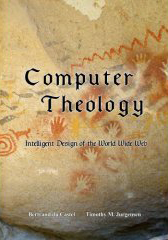PRESS
COMPUTER THEOLOGY |
||||
|
locators it gives in return. The indexing mechanism is dynamic, so as
new resources are made available, they generally become known to the various
search engines. The result is
that finding a particular bit of sustenance on the Internet that can satisfy a
particular appetite is a bit like searching for prey within the primitive
physical ecosystem. The tools are different, and the logical capabilities of
search engine queries give the effect of configurable senses, but save for the
fact that the prey generally wants to be found, the game is much the same. Of
significant importance, at least to our considerations, is the fact that the
role of broker is a concept of some value; in essence, it represents content in
its own right. We would be remiss if we didn’t comment on this. When social
ecosystems come into play, the rules concerning interactions become subjective.
One of the effects of such subjective judgment is the finding that some
appetites shouldn’t be sated. In some instances, prohibitions follow arguably
sound principles; seemingly appropriate moral judgments if you will. Sanctions
against the arbitrary killing of one person by another generally meet with
considerable approval of the relevant social groups. Hence, fulfilling the
appetite of the sociopath is deemed highly inappropriate. In some instances, of
course, satisfying slightly less aberrant appetites meet with considerable, if
not overwhelming, approval. An old adage from the On |
||||
|
||||
© Midori Press, LLC, 2008. All rights reserved for all countries. (Inquiries) The contents of ComputerTheology: Intelligent Design of the World Wide Web are presented for the sole purpose of on-line reading to allow the reader to determine whether to purchase the book. Reproduction and other derivative works are expressly forbidden without the written consent of Midori Press. Legal deposit with the US Library of Congress 1-33735636, 2007.
|
ComputerTheology Intelligent Design of the World Wide Web Bertrand du Castel and Timothy M. Jurgensen Midori Press, Austin Texas 1st Edition 2008 (468 pp) ISBN 0-9801821-1-5 |
Book available at Midori Press (regular) |
